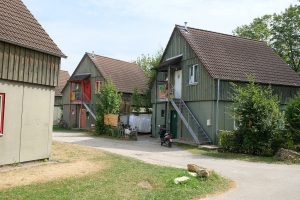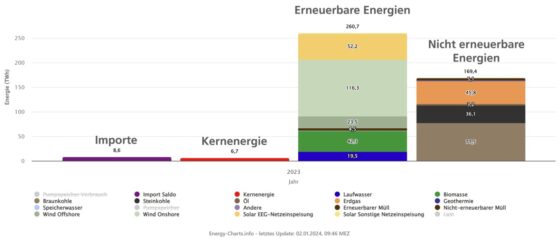 A big thank you to Mr Pohlmeyer for the current photos of the small "Cube settlement".
A big thank you to Mr Pohlmeyer for the current photos of the small "Cube settlement".
To the Photo gallery 9/2016
Keywords: Wood construction, News Blog Baden-Württemberg, Settlements, Residential, sdg21 news
 A big thank you to Mr Pohlmeyer for the current photos of the small "Cube settlement".
A big thank you to Mr Pohlmeyer for the current photos of the small "Cube settlement".
To the Photo gallery 9/2016
 21 November 2019. Today, the Federal Ministry of Transport, together with the federal states and local authorities, is establishing an alliance for modern mobility. The aim is to create more space for environmentally friendly means of transport.
21 November 2019. Today, the Federal Ministry of Transport, together with the federal states and local authorities, is establishing an alliance for modern mobility. The aim is to create more space for environmentally friendly means of transport.
This also includes the rapid expansion of cycling in accordance with the climate package of the Federal Government. The bicycle club ADFC is represented with a keynote speech. ADFC Federal Executive Director Burkhard Stork assures mayors of full support in the expected land conflicts.
ADFC National Director Burkhard Stork said in the run-up to the event: „From 2020, for the first time there will be real money from the federal government to finance high-quality cycle path networks, cycle bridges and cycle parking facilities in the municipalities. To make sure that this money gets to the roads quickly, mayors and their administrations must start planning now - and build really good cycle paths from 2021 at the latest. As everywhere else in the world, there will be conflicts when it comes to redistributing road space. This is where it is important to show attitude and leadership, dear mayors. The ADFC, with its more than 450 branches nationwide, will strengthen you in this!"
Climate package: 900 million euros more for cycling
The papers on the climate package explicitly state that "the potential of cycling, which is far from being exhausted" is to be exploited. Together with the federal states and municipalities, "cycling networks" are to be implemented on which "every road user" will feel safe and "every route can be covered by bicycle". Area-wide cycle path networks" are to be created by converting normal roads into "cycle lanes", "converting lanes into protected cycle lanes", "safely redesigning junctions" and building "modern cycle parking facilities". In addition, cycling traffic is to be accelerated by "green waves" wherever possible.
The Federal Government is investing a lot of money in all these projects: 1.45 billion euros will be available for cycling until 2023, which is an additional 900 million euros in this period. The money is available through medium-term financial planning even after a change of government. StorkAlthough the climate package as a whole is disappointing because it continues to set disincentives for excessive car use, it marks a vehement departure for cycling. Not only does the government intend to at least triple cycling. It also admits that the previous, rather cosmetic methods of promoting cycling do not go far enough. From 2020 onwards, there should be really ambitious and high-quality construction for cycling, that's the signal to the cities!"
About the ADFC
The Allgemeine Deutsche Fahrrad-Club e.V. (ADFC) is with more than 185,000 members the largest representation of interests of cyclists in Germany and worldwide. It advises on all matters relating to bicycles: law, technology and tourism. Politically, the ADFC is committed to the consistent promotion of cycling at regional, national and international level.
Source: ADFC PM from 21.11.2019
Links
www.nakomo.de
Keywords:
Car Free, Bike-/Velo-City, DE-News, Climate protection, Mobility, Transition Town, Environmental policy, Ecology
Net public electricity generation reached a record share of 59.7 per cent in 2023. The share of the load was 57.1 per cent. This is the result of an analysis presented today by the Fraunhofer Institute for Solar Energy Systems ISE. New records were set for wind and solar power in 2023. In contrast, generation from lignite (-27 per cent) and hard coal (-35 per cent) fell sharply. Photovoltaics stood out in the expansion of generation capacity: at around 14 gigawatts, the expansion was in double digits for the first time and significantly exceeded the German government's statutory climate protection target. Source of the data is the platform energy-charts.info

Photovoltaic systems generated approx. 59.9 TWh in 2023, of which 53.5 TWh was fed into the public grid and 6.4 TWh was used for self-consumption. At around 9 TWh, June 2023 was the month with the highest solar power generation ever. The maximum solar output of 40.1 GW was reached on 7 July at 13:15, which corresponded to a 68% share of electricity generation. In 2023, the expansion of photovoltaics significantly exceeded the German government's targets: instead of the planned 9 gigawatts, 13.2 gigawatts were installed by November; according to preliminary data, this will be more than 14 gigawatts by the end of 2023. This is a sharp increase compared to 2022 (7.44 GW). This means that PV expansion in Germany has reached double digits for the first time.
The Hydropower increased from 17.5 TWh in 2022 to 20.5 TWh. The installed capacity of 4.94 GW has hardly changed compared to previous years.
The Biomass at 42.3 TWh was at the level of 2022 (42.2 TWh). The installed capacity is 9 GW.
In total, the renewable energies approx. 260 TWh in 2023, around 7.2 per cent more than in the previous year (242 TWh). The share of renewable energy generated in Germany in the load, i.e. the electricity mix that actually comes out of the socket, was 57.1 per cent compared to 50.2 per cent in 2022. In addition to net public electricity generation, total net electricity generation also includes in-house generation by industry and commerce, which is mainly generated using gas. The share of renewable energies in total net electricity generation, including the power plants of "businesses in the manufacturing, mining and quarrying sectors", is around 54.9 per cent (2022: 48.2 per cent).
The Load in the electricity grid totalled 457 TWh, around 26 TWh less than in 2022. Due to the high electricity prices and higher temperatures, electricity was probably saved significantly. The increase in self-consumption of solar power is also reducing the load. The load includes the electricity consumption and grid losses, but not the pumped-storage power consumption and the self-consumption of conventional power plants.
After German coal-fired power plants ramped up their production in 2022 - due to the outage of French nuclear power plants, but also due to the distortions in the electricity market caused by the war in Ukraine - their share fell significantly in 2023. As a result, generation in November 2023 was 27 per cent below the same month in the previous year due to the drop in coal-fired electricity exports, but also because of the good wind conditions.
Overall, production from Lignite for public electricity consumption fell by around 27 per cent, from 105.9 to 77.5 TWh. This is in addition to 3.7 TWh for industrial own consumption. Gross electricity generation fell to the level of 1963.
Net production from Hard coal-fired power plants for public electricity consumption was 36.1 TWh (-35 per cent) and 0.7 TWh for industrial own consumption. It was 21.4 TWh lower than in 2022. Gross electricity generation fell to the level of 1955. Natural gas for electricity generation remained slightly below the previous year's level at 45.8 TWh for public electricity supply and 29.6 for industrial own consumption. Due to the shutdown of the last three nuclear power plants in Emsland, Neckarwestheim and Isar on 15 April 2023, the Nuclear power only contributed 6.72 TWh to electricity generation, which corresponds to a share of 1.5 per cent.
The expansion of fluctuating renewable energies also increases the need for grid expansion and storage capacity. Battery storage systems, which are installed on a decentralised basis to buffer the generation of wind and solar power, are particularly suitable. The private household segment is showing strong growth, as is the case with photovoltaic systems. Overall, installed battery capacity almost doubled from 4.4 GW in 2022 to 7.6 GW in 2023, while storage capacity rose from 6.5 GWh to 11.2 GWh. The capacity of German pumped storage plants is around 6 GW.
After an export surplus of 27.1 TWh was achieved in electricity trading in 2022, an import surplus of 11.7 TWh was recorded in 2023. This was due in particular to the lower electricity generation costs in neighbouring European countries in the summer and the high costs of CO2-certificates. The majority of imports came from Denmark (10.7 TWh), Norway (4.6 TWh) and Sweden (2.9 TWh). Germany exported electricity to Austria (5.8 TWh) and Luxembourg (3.6 TWh).
In winter, electricity exchange prices rose again and CO2-certificates became more favourable. This already led to a balance in November and, in conjunction with high wind power generation, to export surpluses in December. In contrast to its neighbouring countries (Austria, Switzerland, France), Germany also has sufficient power plant capacity in winter to produce electricity for export.
The average volume-weighted day-ahead price Exchange electricity price fell sharply to €92.29/MWh or 9.23 cents/kWh (2022: €230.57/MWh). This puts it back at the 2021 level.
A detailed presentation of the data on electricity generation, imports/exports, prices, installed capacity, emissions and climate data can be found on the Energy Charts Server:
www.energy-charts.info/downloads/Stromerzeugung_2023.pdf

The data basis
This first version of the annual evaluation takes into account all electricity generation data from the Leipzig electricity exchange EEX and the European Network of Transmission System Operators for Electricity (ENTSO-E) up to and including 31 December 2023. The quarter-hourly values from the EEX were energetically corrected using the available monthly data from the Federal Statistical Office on electricity generation up to September 2023. For the remaining months, the correction factors were estimated on the basis of past monthly and annual data. The extrapolated values from October to December are subject to larger tolerances.
This is based on the data for the German Net electricity generation to the public electricity supply. It is the difference between gross electricity generation and the power plants' own consumption and is fed into the public grid. The electricity industry calculates with net figures, e.g. for electricity trading and grid utilisation, and only net electricity generation is traded on the electricity exchanges. It represents the electricity mix that actually comes out of the socket at home.
Hourly updated data on electricity generation can be found here: https://www.energy-charts.info
Keywords:
DE-News, Renewable, Climate protection, New books and studies, PV, Environmental policy
In the Federal Republic of Germany, more than 720 million square metres of building surface have been covered with polystyrene since the Second World War.
Now, according to manager magazins, a series of major fires in industry has startled the insurance industry. Accordingly, the insurance industry now openly advises against not only Styrofoam as an insulating material for commercial enterprises, but also against the raw material polystyrene and the related EPS rigid foam.
"The critical fire behaviour of EPS rigid foam is well known," a spokeswoman for the insurance association GDV told manager-magazin.de.
You can find the whole article from 3.1.2017 in the manager magazin
Keywords:
Stock, DE-News, Resource efficiency, Environmental policy, Housing policy, Thermal insulation, Economics
City as a pioneer of mobility change
Wuppertal is making waves when it comes to sustainable and modern transport systems. It is not only the 100-year-old suspension railway that has long symbolised the city as an innovative mode of transport. The new northern railway line for cyclists and pedestrians above the rooftops of the city has brought great recognition nationwide. A modern urban cable car is planned as a new mode of transport and is hotly debated.
And now the renowned Wuppertal Institute for Climate, Environment and Energy has presented the study "Car-free city centre Wuppertal Elberfeld", which provides further impetus for the mobility turnaround in Wuppertal and builds on a changed mobility culture.
To the study:
https://wupperinst.org/a/wi/a/s/ad/3969/
Keywords:
Car Free, Bike-/Velo-City, Mobility, News Blog NRW, City, Transition Town